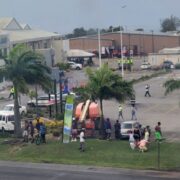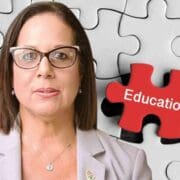Black Immigrant Daily News
Readers are asked to note that Op-eds do not necessarily reflect the opinions or beliefs of Loop Cayman.
By Barbara Conolly, Shadow Minister for Education
An Education Strategy That Adds Up
“An investment in knowledge pays the best interest” … Benjamin Franklin
The workforce of the future will be more highly skilled than the workforce of the past. Whatever career routes young people aspire to follow, a good education that allows them to develop the skills that the job market will require is essential.
The results that Caymanian students achieve at the end of their high school education are improving. However, we must accelerate the rate of improvement if we are to ensure that our young people are able to fulfil their potential.
The first thing that is necessary is for the PACT government to continue to implement the reforms that were begun by the last two Progressives-led Administrations.
Those two Progressives-led governments finally brought some much-needed stability to the education system and some real vision for improvement. Minister Rivers put in the foundation during the first term to update the legislation and to establish baselines for improvement in schools.
During the second term, Minister O’Connor-Connolly implemented a series of reforms that built upon Minister Rivers’ foundation. Those reforms included changes in the national curriculum and improving the pay and training of teachers so that Cayman could recruit, retain, and develop the high-quality teachers that our students deserve.
There is solid evidence that our programme of reforms is succeeding.
Perhaps the most significant indicator for the long term is that School Inspection Reports confirm that our schools are getting better. That is the key to long term improvement. The round of inspections of our high schools carried out by the independent Office of Education Standards inspections in the Spring of 2021 found improvements in all three schools.
The John Gray inspection rated the school as ‘good’ and identified excellent leadership and good improvement in the quality of teaching which is the most important factor in delivering the improved outcomes for students that we set out to deliver. The Layman E Scott Sr High School on Cayman Brac also achieved a rating of ‘good’ and Clifton Hunter also improved, raising its rating from ‘weak’ to ‘satisfactory.’
While these achievements are the results of a lot of hard work by staff in our high schools, the consistent pattern of improvement demonstrates that improvement was happening because of the Progressives-led government’s national programme.
We in the Opposition have therefore been consistent in offering our support to the Minister of Education as she continues down the path we set.
However, we have also pushed the Minister to make sure that the government rapidly implements the reforms that are necessary. It is for that reason, for example, that I raised questions in Parliament recently about the pace of implementation of the national curriculum and the delivery of improvements in the way that we support early years development.
I will continue to challenge the Minister and to press for delivery at pace of the reforms we know are vital if our young people are to get the best possible start in life.
The best way to judge whether education in the Cayman Islands’ public schools is improving is to look at the results our young people are achieving.
In April of this year, the Ministry of Education released their data report for the 2020-21 academic year. In the report, as well as telling the story of that year, the Ministry looked back at the trends in performance over recent years. Looking across a range of indicators for the level of attainment of our 16-year-old students at the end of Year 11, the report found clear trends of improving performance over a five-year period.
That trend of improvement indicates that results are getting better because of the systematic measures that successive Progressives-led governments put in place.
The trend is encouraging, but a closer look at the data shows there is still much work to be done. The expected national standard at Year 11 is the achievement of five or more Level 2 subjects including mathematics and English.
While there is a clear trend of improvement in the achievement of the national standard, the rate at which this indicator is improving needs to increase significantly if Cayman’s schools are to be regarded as delivering the quality of education that our students deserve.
Students need to get to the standard level, including achieving the necessary levels in English and math, if they are to maximise future job opportunities. Those core skills are vital not just for the digital industries that are held up as being the future for our Islands. They are important skills for jobs in retail, in tourism and in a range of service jobs.
And we know from what employers tell us that too many high skills leavers are still not sufficiently skilled in those core disciplines to be as successful as we all want them to be in their future lives.
The single most important thing we could do would be to drive up levels of attainment in mathematics. Itis clear from the data presented by the Ministry that the key issue holding back overall performance is the low pass rate for mathematics. Improving mathematics attainment levels would improve both the level of national performance and the life-chances of the students concerned.
The data report also shows that the proportion of students achieving five or more Level 2 subjects in any subjects is significantly higher than the proportion achieving five or more including mathematics and English.
In 2021, 59.9 per cent of students achieved five Level 2 subjects but the pass rate of only 43.2 per cent in mathematics held back the level of achievement of the overall national standard to only 40.3 per cent. The current level of broad achievement of five Level 2 subjects suggests that if mathematics results could be improved at a faster rate, then this would have a corresponding positive impact on the overall national standard achievement rates.
It is worth recording that we are already seeing improvements in the level of attainment in mathematics.
We know that not just because Cayman’s own results are improving but because they are getting better when we compare them to our neighbouring countries. Looking right back to the start of the last two Progressives-led Administrations we can see clearly that Caymanian students have improved their performance in mathematics relative to the average for the Caribbean over the last decade. Attainment levels in mathematics in Cayman first went above the Caribbean regional average in 2017 and after slipping back a little have been above the average for the last two years.
This is encouraging and reflects a lot of hard work from teachers and students.
We also know from the data that a significant proportion of Caymanian students are getting close to the expected standard in mathematics but not quite making it over the line. In the 2021 examinations, more than a quarter of Caymanian students (28 per cent) achieved a result in their examinations in mathematics that was only one grade below the standard.
What lies behind those results is that students are not making as much progress in mathematics as they are in English or science. The Ministry’s report presents what is known as ‘added value’ data which compares the actual results achieved by individual students with their predicted performance based on previous cognitive ability tests. The report states that for English and science, students are improving by an average of 1.2 grade points above expectations, but for mathematics less than a half of one grade point is added.
If we could do as well in improving performance in mathematics as we do in other subjects, we could expect a good number of those currently falling just below the standard to achieve passing grades. We owe it to those students to give them the support they need. In doing so, we will also significantly accelerate the national level of performance.
We should expect that over time the reforms being implemented will help to drive up standards. In particular, the new national curriculum and the new teaching and learning methods that will be introduced with it are designed to improve levels of attainment by students. That is why I have continued to press the Minister on implementation of the curriculum.
However, we should not just sit back and wait. If we do so, more Caymanian students will not be reaching their potential. A new strategy to support students better to progress in mathematics during key stage four should be devised and introduced immediately. The strategy should target those students who might need extra support to ensure that they get ‘over the line’ and meet the standard in the Year 11 assessment.
International evidence tells us that beyond the curriculum itself, the most important thing is for teachers to adopt differentiated classroom instruction, flexible grouping, and continuous assessment with immediate intervention for students who were not mastering mathematics standards. This will ensure that teachers give students the individual instruction they need to succeed. Teacher collaboration, within and across grade levels, ensures there is continuity in mathematics instruction which better ensures students progress.
As I have said repeatedly, in the end it is the quality of teaching that makes the most difference to results. Therefore, the new strategy should focus on supporting the development of our teachers.
The first step should be to ensure that Cayman’s high schools learn from each other, and that national best practice is consistently applied across the education system. In 2021, Clifton Hunter’s attainment rate in mathematics, 52 per cent, was significantly better than that at John Gray (35 per cent). It is unclear whether this represents a one off ‘blip’. However, comparison of teaching practice should be made and the best practice across all three high schools should be universally adopted.
Successful international strategies can then be drawn upon to supplement the good practice that is already in our high schools.
In this way we can create a new key stage four mathematics improvement strategy to support Caymanian public-school students to reach their potential. This will give them the best possible chances of success in the future workforce.
The by-product would be a significant improvement in the country’s headline rate of overall achievement in the expected standard of 5 passes, including mathematics and English.
NewsAmericasNow.com










